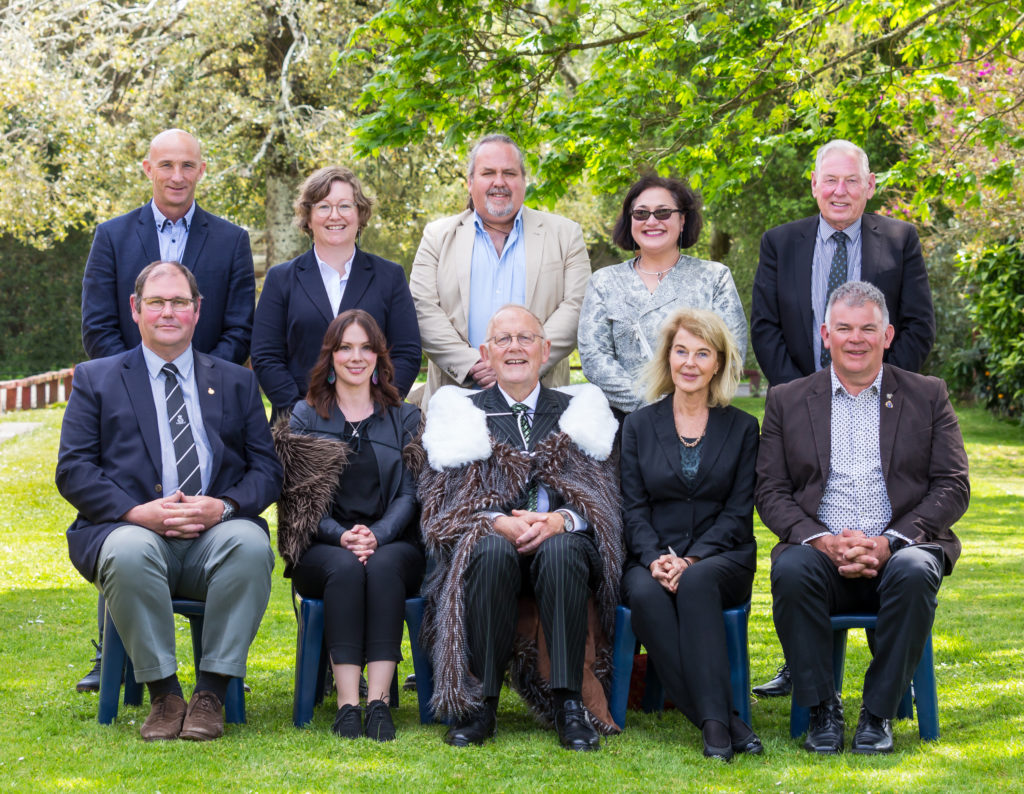About Council – Who we are
Here at Council we are proud to serve and support this fabulous part of New Zealand with its true ‘mountains to the sea’ experience. South Wairarapa encompasses the three towns of Featherston, Greytown and Martinborough, along with a number of rural communities, each with their own charm and attributes.

Seated: Cr Alistair Plimmer, Deputy Mayor/Cr Melissa Sadler-Futter, Mayor Martin Connelly, Cr Kaye McAuley, Cr Aidan Ellims
We have a vast area of rural hinterland home to many more small communities, edged by the Remutaka/Tararua Ranges and cradled by kilometres of rugged coastline. Our vision is ‘the best of country living with the community at the heart of everything we do’ and we are working hard to achieve this.
We believe that a Council should be part of the community it serves and therefore welcome feedback from residents and visitors alike regarding our district and Council services.
The purpose of Council is to enable democratic local decision-making and action by, and on behalf of, communities and to meet the current and future needs of communities for good quality local infrastructure, local public services and performance of regulatory functions in a way that is most cost-effective for households and businesses.
Council membership is comprised of the Mayor and all councillors. The Chair of the Māori Standing Committee may attend and participate in debate but does not have voting rights.
Local Governance Statement
The Local Governance Statement is a requirement of section 40 of the Local Government Act 2002 and is available to view from here.
Council Standing Orders
Standing Orders are a set of rules that provide a formal framework for the conduct of local authority meetings. They also outline the Council’s agreed principles of behavior within meetings.
All councils are required by the Local Government Act 2002 to adopt a set of standing orders that control the way the council’s meetings are conducted. Elected members must abide by the Standing Orders adopted by the Council.
Code of Conduct
All elected members are required to adhere to a code of conduct. Adopting such a code is a requirement of the Local Government Act 2002. Once it is adopted such a code may only be amended by a 75 percent or more vote of the council. Council adopted its Code of Conduct on the 2 August 2023.
Functions, responsibilities and activities
The Council’s Long Term Plan, adopted on 30 June 2021 provides information about the Council’s work programme for the next 10 years to with a focus on the first three years.
Register of Interests
The Register of Pecuniary Interests (the Register) is published pursuant to Section 54A of the Local Government Act (the Act). The Act requires South Wairarapa District Council to publish a summary of elected members’ financial, business and personal interests including certain assets, financial and business associations and gifts they have received annually. Elected members are provided a declaration form to complete annually, once returned to Council officers a summary of the information is collated and published on our website.
